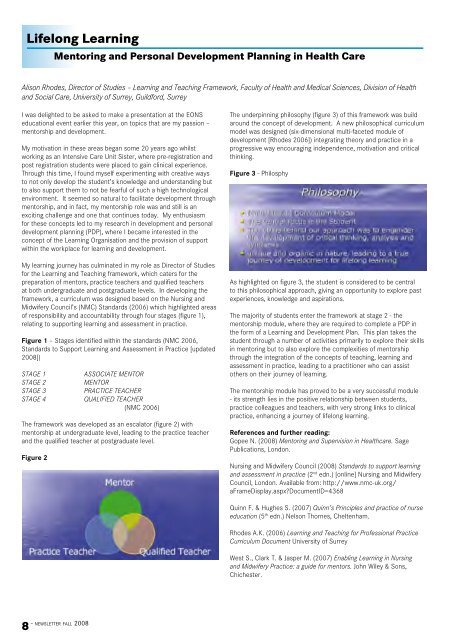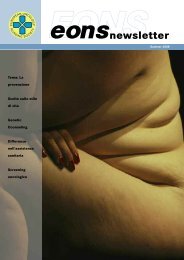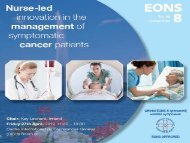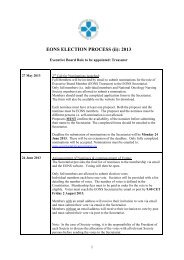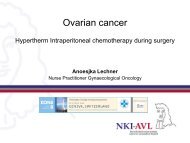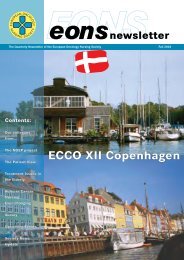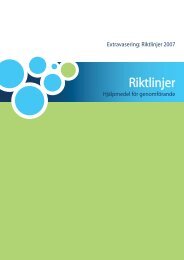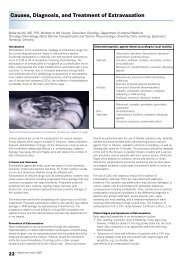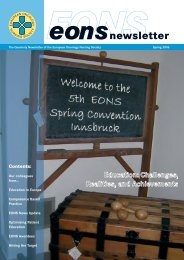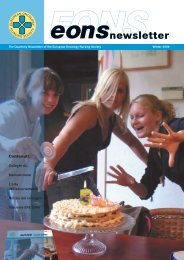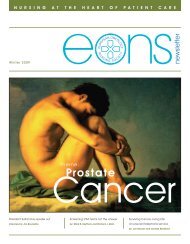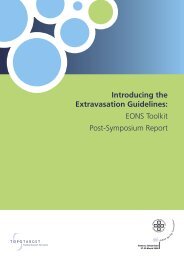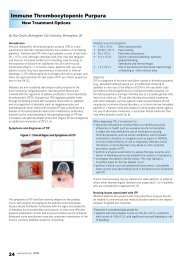Lifelong LearningMentoring and Personal Development Planning in Health CareAlison Rhodes, Director of Studies – Learning and Teaching Framework, Faculty of Health and Medical Sciences, Division of Healthand Social Care, University of Surrey, Guildford, SurreyI was delighted to be asked to make a presentation at <strong>the</strong> EONSeducational event earlier this year, on topics that are my passion –mentorship and development.My motivation in <strong>the</strong>se areas began some 20 years ago whilstworking as an Intensive Care Unit Sister, where pre-registration andpost registration students were placed to gain clinical experience.Through this time, I found myself experimenting with creative waysto not only develop <strong>the</strong> student’s knowledge and understanding butto also support <strong>the</strong>m to not be fearful of such a high technologicalenvironment. It seemed so natural to facilitate development throughmentorship, and in fact, my mentorship role was and still is anexciting challenge and one that continues today. My enthusiasmfor <strong>the</strong>se concepts led to my research in development and personaldevelopment planning (PDP), where I became interested in <strong>the</strong>concept of <strong>the</strong> Learning Organisation and <strong>the</strong> provision of supportwithin <strong>the</strong> workplace for learning and development.My learning journey has culminated in my role as Director of Studiesfor <strong>the</strong> Learning and Teaching framework, which caters for <strong>the</strong>preparation of mentors, practice teachers and qualified teachersat both undergraduate and postgraduate levels. In developing <strong>the</strong>framework, a curriculum was designed based on <strong>the</strong> <strong>Nursing</strong> andMidwifery Council’s (NMC) Standards (2006) which highlighted areasof responsibility and accountability through four stages (figure 1),relating to supporting learning and assessment in practice.Figure 1 – Stages identified within <strong>the</strong> standards (NMC 2006,Standards to Support Learning and Assessment in Practice [updated2008])STAGE 1STAGE 2STAGE 3STAGE 4ASSOCIATE MENTORMENTORPRACTICE TEACHERQUALIFIED TEACHER(NMC 2006)The framework was developed as an escalator (figure 2) withmentorship at undergraduate level, leading to <strong>the</strong> practice teacherand <strong>the</strong> qualified teacher at postgraduate level.Figure 2The underpinning philosophy (figure 3) of this framework was buildaround <strong>the</strong> concept of development. A new philosophical curriculummodel was designed (six-dimensional multi-faceted module ofdevelopment [Rhodes 2006]) integrating <strong>the</strong>ory and practice in aprogressive way encouraging independence, motivation and criticalthinking.Figure 3 - PhilosphyAs highlighted on figure 3, <strong>the</strong> student is considered to be centralto this philosophical approach, giving an opportunity to explore pastexperiences, knowledge and aspirations.The majority of students enter <strong>the</strong> framework at stage 2 - <strong>the</strong>mentorship module, where <strong>the</strong>y are required to complete a PDP in<strong>the</strong> form of a Learning and Development Plan. This plan takes <strong>the</strong>student through a number of activities primarily to explore <strong>the</strong>ir skillsin mentoring but to also explore <strong>the</strong> complexities of mentorshipthrough <strong>the</strong> integration of <strong>the</strong> concepts of teaching, learning andassessment in practice, leading to a practitioner who can assisto<strong>the</strong>rs on <strong>the</strong>ir journey of learning.The mentorship module has proved to be a very successful module- its strength lies in <strong>the</strong> positive relationship between students,practice colleagues and teachers, with very strong links to clinicalpractice, enhancing a journey of lifelong learning.References and fur<strong>the</strong>r reading:Gopee N. (2008) Mentoring and Supervision in Healthcare. SagePublications, London.<strong>Nursing</strong> and Midwifery Council (2008) Standards to support learningand assessment in practice (2 nd edn.) [online] <strong>Nursing</strong> and MidwiferyCouncil, London. Available from: http://www.nmc-uk.org/aFrameDisplay.aspx?DocumentID=4368Quinn F. & Hughes S. (2007) Quinn’s Principles and practice of nurseeducation (5 th edn.) Nelson Thornes, Cheltenham.Rhodes A.K. (2006) Learning and Teaching for Professional PracticeCurriculum Document University of SurreyWest S., Clark T. & Jasper M. (2007) Enabling Learning in <strong>Nursing</strong>and Midwifery Practice: a guide for mentors. John Wiley & Sons,Chichester.- newsletter fall 20088
New Education Standards for Nurses in TurkeyImplementation of Chemo<strong>the</strong>rapy <strong>Nursing</strong> Certificate ProgramSultan Kav, Fatma Gundogdu, Nurgün Platin, Figen Bay Kara, Meral Bakar, Kadriye Sanci, Kıymet Akgedik, <strong>Oncology</strong> <strong>Nursing</strong>Association of Turkey, Board MembersBackground and AimNurses caring for patients receiving chemo<strong>the</strong>rapy requirespecialized knowledge and skills in order to ensure <strong>the</strong> safetyof both <strong>the</strong> patient and <strong>the</strong> nurse. In Turkey, while some of <strong>the</strong>universities and oncology institutes organize local courses, whichrange from 2- to3-days and are intended as in-service education,<strong>the</strong>re is no agreed educational standard for nurses working inchemo<strong>the</strong>rapy settings. Many Turkish nurses lack <strong>the</strong> necessaryinformation to care for patients receiving chemo<strong>the</strong>rapy and havenot received education regarding safe handling or administrationof chemo<strong>the</strong>rapy agents (Burgaz et al, 1999; Karadag et al, 2004;Turk et al, 2004; Kosgeroglu et al, 2006).In light of this situation, <strong>the</strong> <strong>Oncology</strong> <strong>Nursing</strong> Association ofTurkey developed a chemo<strong>the</strong>rapy certificate program for nurses.The program has received approval by <strong>the</strong> Ministry of Health.Contents of <strong>the</strong> ProgramThe course is of 37 hours in length and consists of 27 hoursof <strong>the</strong>oretical and 10 hours of practical training. The durationof <strong>the</strong> course is five working days. The EONS Core Curriculumfor a Post-Registration Course in Cancer <strong>Nursing</strong>, <strong>the</strong> <strong>Oncology</strong><strong>Nursing</strong> <strong>Society</strong>’s (ONS) Cancer Chemo<strong>the</strong>rapy Guidelines andRecommendations for Practice and, <strong>the</strong> needs of nurses weretaken into consideration developing <strong>the</strong> educational program.Theoretical and practical content of <strong>the</strong> Chemo<strong>the</strong>rapy<strong>Nursing</strong> Certificate ProgramTheoretical content- Carcinogenesis, epidemiology and etiology- Diagnostic procedures and treatment methods- Legal and ethical aspects- Basic principles of chemo<strong>the</strong>rapy- Safety precautions in chemo<strong>the</strong>rapy- Assessment and monitoring of <strong>the</strong> patient- Patient and family educationPractical contentVisiting a day-treatment unit with supervision provided by adesignated mentor. Each participant administers at least fivedifferent groups of chemo<strong>the</strong>rapy agents.CertificateParticipants who successfully meet <strong>the</strong> expected achievementare issued <strong>the</strong> “<strong>Oncology</strong> Nurses Association Chemo<strong>the</strong>rapyCertificate”. The certificate is valid for three years and must berenewed.EligibilityThe registration requirement for <strong>the</strong> course is at least 6 months ofexperience in chemo<strong>the</strong>rapy administration.Educators /TrainersThe <strong>the</strong>oretical content of <strong>the</strong> course is delivered by clinicaland academic nurses experienced in <strong>the</strong> field of oncology,pharmacologists and medical oncologists. During <strong>the</strong> practical partor <strong>the</strong> hands-on parts of <strong>the</strong> program, participants are supervisedby experienced clinical nurses.Evaluation of <strong>the</strong> ParticipantsThe participants are evaluated on <strong>the</strong> basis of <strong>the</strong>ir hands-onpractice (100 % performance is expected) and <strong>the</strong> result of <strong>the</strong>written <strong>the</strong>oretical test (at least 80 % performance is expected).Pre-test / post-test evaluation is used to monitor individual andgroup achievement.Implementation of <strong>the</strong> ProgramFrom September 2005 to February 2008, total of ten courses wereorganized in Ankara and 306 nurses (from all over <strong>the</strong> country)were issued a chemo<strong>the</strong>rapy certificate. According to <strong>the</strong> pre-testand post-test scores, <strong>the</strong> nurses showed a great improvement in<strong>the</strong>ir understanding of administering chemo<strong>the</strong>rapy and monitoringside effects.Figure 1: Pre-test and Post-test Results (Means)Conclusion and Plans for <strong>the</strong> FutureOverall, participants rated <strong>the</strong> courses “highly beneficiary” andstated that <strong>the</strong>y became “more confident” with <strong>the</strong> care of <strong>the</strong>chemo<strong>the</strong>rapy patient. Recently “The training of <strong>the</strong> trainers”program was organized for <strong>the</strong> potential educators of <strong>the</strong> program.A study on <strong>the</strong> assessment of <strong>the</strong> effectiveness of <strong>the</strong> program on<strong>the</strong> care of <strong>the</strong> nurses is being planned.ReferencesBurgaz S, Karahalil B, Bayrak P, et al. Urinary cyclophosphamideexcretion and micronuclei frequencies in peripheral lymphocytesand in exfoliated buccal epi<strong>the</strong>lial cells of nurses handlingantineoplastics. Mutat Res 1999; 439: 97-104.Karadag A, Unlu H, Yavuzarslan F, Gundogdu F, Kav S, TerziogluF, Taskin L. Profile of nurses working in oncology departments inTurkey. Turk J Cancer 2004, 34: 24-34.Turk M, Davas A, Ciceklioglu M, Sacaklioglu F, Mercan T.Knowledge, attitude and safe behaviour of nurses handlingcytotoxic anticancer drugs in Ege University Hospital. Asian Pac JCancer Prev 2004; 5:164-8.Kosgeroglu N, Ayranci U, Ozerdogan N, Demirustu C.Turkish nurses’ information about, and administration of,chemo<strong>the</strong>rapeutic drugs. J Clinl Nurs 2006; 15: 1179–1187.newsletter fall 2008 -9


